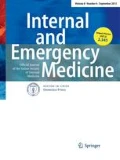Dear Editor
I would like to thank Dr. Laviano and colleagues for their interest in our work [1]. Substantially, they were surprised not to find information on the nutritional status of advanced cancer patients who were admitted to hospital where they then died, after being followed at home by a specialized palliative care team [2]. According to their letter title, “nutritional status is a predictor of outcome irrespective of stage,” one can suppose that the study analyzed predictive factors of survival in cancer patients. While we agree with the need to assess the nutritional status in cancer patients, their complaints, however, are not pertinent within the context and the objectives of the study, and possibly reflect their internist background without any vocation for end-of-life issues. The aim of the study was to assess the characteristics of patients transported to hospital in the last days of life when almost all patients are cachectic, have poor appetite, are not able to swallow, according to many scientific data and consolidated experience by professionals skilled in palliative care. Consequently, this data would not have any influence as a variable that characterizes these patients. This finding is so obvious and predictable that it was not taken into consideration. On the other hand, probably Dr. Laviano and colleagues did not note that data were retrieved from hospital charts and assessment was not a priori determined by physicians in the hospital ward, as they were unaware of the study at that moment. Thus, this kind of information in any case would have not been available in most cases. In research, it is important to focus on relevant information according to the context and type of patients. A well-known information, such as a minimal or no food intake, or advanced cachexia in patients close to death, represents an obviousness, and is the least problem in a dying patient.
References
Laviano A, Rossi Fanelli F (2016) Nutritional status is a predictor of outcome in cancer patients, irrespective of stage. Int Emerg Med. doi:10.1007/s11739-016-1539-y
Mercadante S, Masedu F, Valenti M, Mercadante A, Aielli F (2016) The characteristics of advanced cancer patients followed at home, but admitted to the hospital for the last days of life. Int Emerg Med 11:713–718
Author information
Authors and Affiliations
Corresponding author
Ethics declarations
Conflict of interest
The authors declare that they have no conflict of interest.
Statement of human and animal rights
This article does not contain any studies with human participants or animals performed by any of the authors.
Informed consent
For this type of study formal consent is not required.
Rights and permissions
About this article
Cite this article
Mercadante, S. Obviousness in the dying patient. Intern Emerg Med 12, 137 (2017). https://doi.org/10.1007/s11739-016-1562-z
Received:
Accepted:
Published:
Issue Date:
DOI: https://doi.org/10.1007/s11739-016-1562-z

